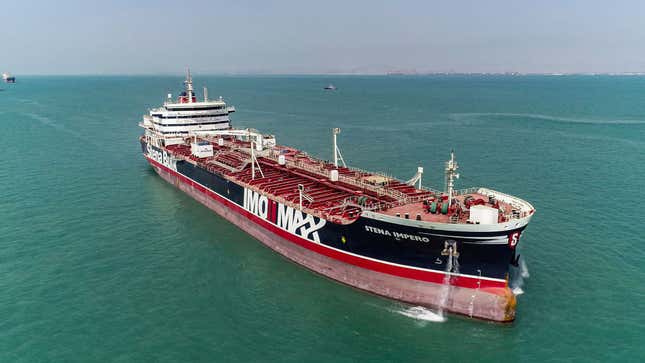
Right now, the world is producing way, way too much oil. We just have too much of the stuff. This is causing some very serious political and economic headaches right now, but it’s a boom for oil traders storing oil in tankers all over the world’s oceans.
The world has a lot of oil right now because the U.S. started fracking and Russia and OPEC have been in a race to the bottom to flood the market with their own supply while hoping to starve out some of the competition. While this drops the price of a barrel of oil and makes gas cheaper at the pump, it’s not so good for the oil producers, who could easily fix prices higher if there wasn’t so much supply coming from everywhere else.
On top of that, the outbreak of COVID-19 means nobody is using all of the oil we already have. This has created a storage issue on land, so traders who buy from the suppliers and sell the oil in the futures market at a higher price have started buying out oil tankers to fill up and sit on until later.
From Bloomberg:
From the coast of Singapore to the North Sea, the tankers are starting to slow down, ready to drop their anchors, holding crude the world economy doesn’t need as fuel demand plummets due to the coronavirus outbreak. And more tankers probably will be needed, as oil supply still runs well above demand.
“The world is overproducing oil at a historic rate,” said Robert Hvide MacLeod, the head of Frontline Management, one of the world’s largest operators of supertankers. “Land-based storage is limited and selling out fast. Storage on ships will be the only solution.”
[...]
The oil market has flipped upside down, with the cost of a barrel of oil today far below what the market is willing to pay in, say, six months or a year. It’s what traders call a contango market. As oil is cheaper today than in 2021, a trader can buy crude now, put it on storage, while simultaneously selling in the forward market, in effect locking in the price difference between the different dates. As long as the contango is wide enough to cover the cost of storage, finance and insurance, the transaction is profitable.
So the trader gets money now, and the tanker with the oil just has to sit there until its order is up. Think of it like a pizza place that keeps a few pies warm for pickup.
Of course, if the traders are making money and buying up tanker volume, the owners of the tankers are also making a pretty penny off of the situation, too.
This isn’t really a big deal, and tankers have been used for storage in the past. It’s just not something that’s really happened on this scale before. It’s kind of strange to think of hundreds, if not thousands of ships out there, full of oil, just sitting for months at a time.
Do you have surplus oil? I’ll take a couple barrels off your hands.